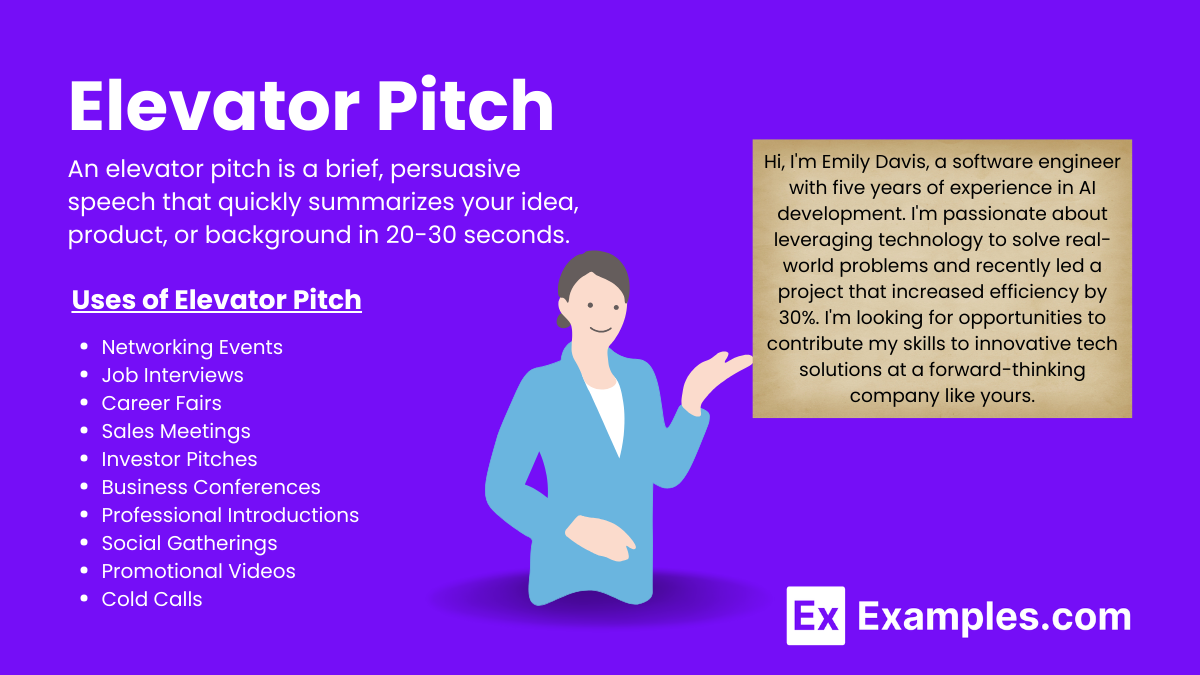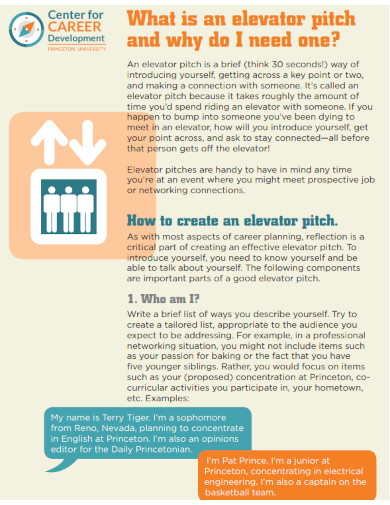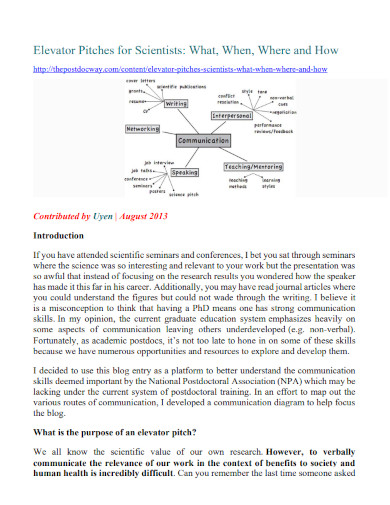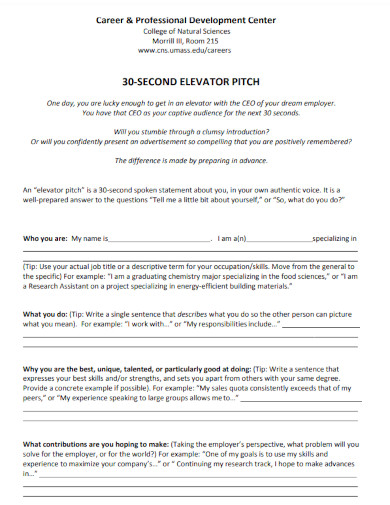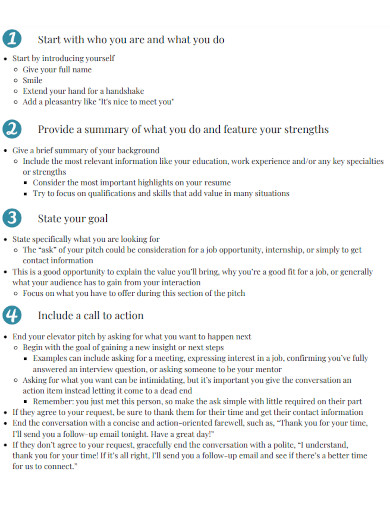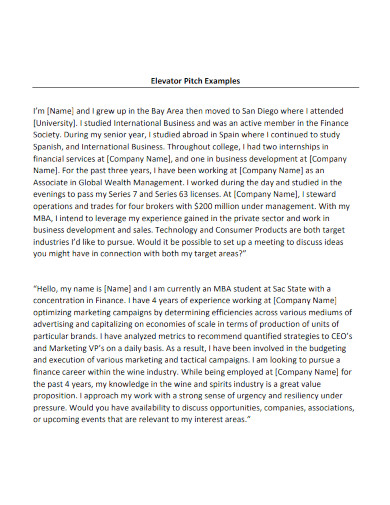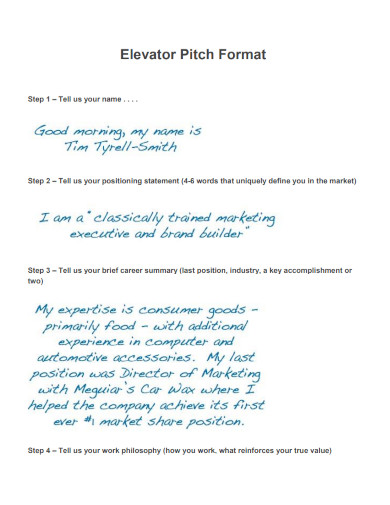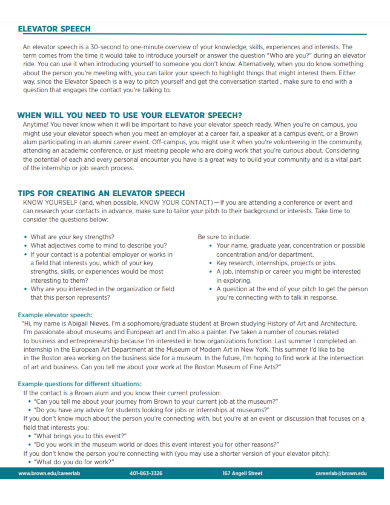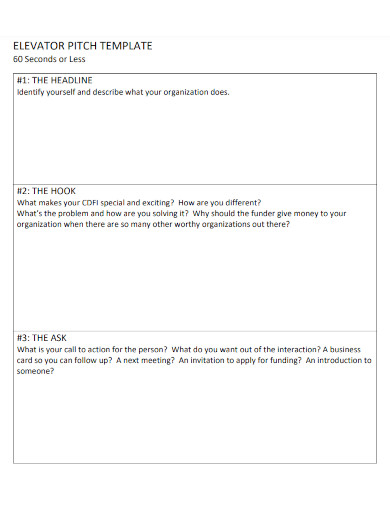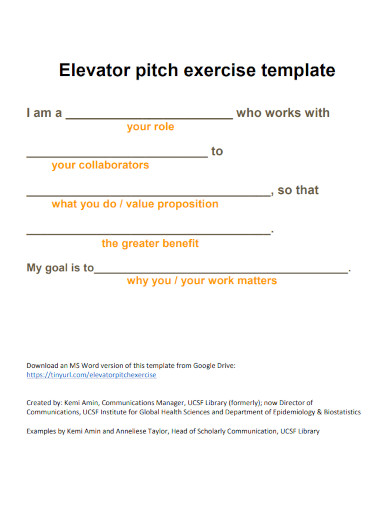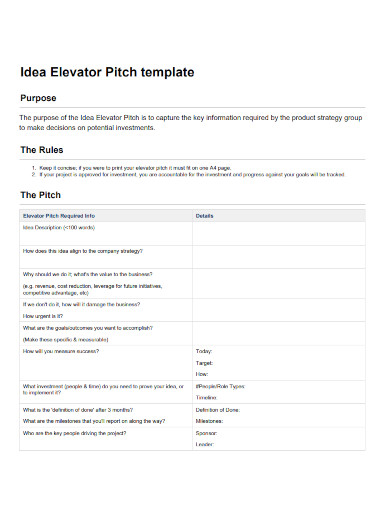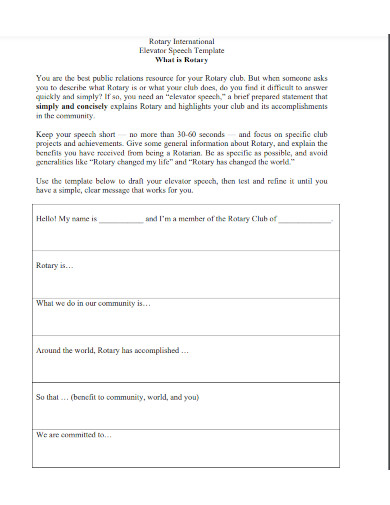Elevator Pitch
An elevator pitch is a critical tool in the world of communication and professional networking. It serves as a brief, impactful statement that can captivate an audience’s attention in a short period, typically the duration of an elevator ride. This pitch is designed to succinctly convey the essence of a product, idea, or personal brand, making it an invaluable asset for entrepreneurs, job seekers, and sales professionals aiming to leave a lasting impression and open the door to further dialogue and opportunities.
What is an Elevator Pitch?
An elevator pitch is a concise, persuasive speech designed to spark interest in a product, idea, or person within 30-60 seconds. It highlights a unique value proposition and is ideal for networking, job interviews, and sales opportunities, aiming to make a strong, memorable impression quickly and effectively.
Elevator Pitch Format
Creating an effective elevator pitch involves a structured format that ensures clarity and impact. Here’s a simple and powerful format to follow:
1. Introduction
- Greeting: Start with a polite greeting and a quick introduction of yourself.
- Hook: Use a captivating opening statement to grab attention.
2. Objective
- Purpose: Clearly state the purpose of your pitch. This could be introducing a product, seeking a job opportunity, or presenting an idea.
- Value Proposition: Highlight what makes your product, idea, or skills unique and valuable.
3. Key Points
- Problem/Solution: Identify a problem and briefly explain how your offering provides a solution.
- Benefits: Outline the main benefits and advantages.
4. Call to Action
- Engagement: Invite further discussion or action. This could be setting up a meeting, requesting feedback, or asking for a business card.
5. Conclusion
- Closing Statement: End with a strong, memorable closing line.
- Thank You: Politely thank the listener for their time and consideration.
Example Elevator Pitch
“Hello, my name is Jane Doe. I specialize in digital marketing strategies that boost small business growth. Did you know that 60% of small businesses struggle with online visibility? I developed a comprehensive marketing plan that increased my last client’s web traffic by 50% in just three months. I’d love to discuss how I can help your business achieve similar results. Can we schedule a meeting next week?”
Elevator Pitch Examples:
Elevator Pitch Examples for Students
Aspiring Graphic Designer
“Hi, I’m Alex Martinez, a junior at XYZ University majoring in Graphic Design. I’m passionate about creating visually compelling designs and have honed my skills through various freelance projects and internships. Last summer, I redesigned a local business’s branding, resulting in a 30% increase in customer engagement. I’m excited to bring my creativity and expertise to a dynamic team like yours. Could we discuss potential internship opportunities?”
Marketing Student Seeking Internship
“Hello, my name is Sarah Johnson. I’m a senior at ABC University majoring in Marketing. Recently, I led a project that increased our campus event attendance by 40% through targeted social media campaigns. I’m eager to apply my skills in digital marketing and analytics in a professional setting. Can we set up a time to talk about how I could contribute to your marketing team?”
Computer Science Student with App Development Experience
“Hi, I’m John Doe, a sophomore studying Computer Science at DEF University. I’ve developed a mobile app that helps students manage their time more effectively, which has been downloaded over 10,000 times. I have strong programming skills in Java and Python and am looking for opportunities to apply my technical abilities in a challenging environment. Could we chat about internship possibilities at your company?”
Business Student Interested in Finance
“Hello, my name is Emily White, and I’m a junior at GHI University majoring in Business with a focus on Finance. I recently completed an internship at a local bank, where I assisted in analyzing financial statements and developing investment strategies. My work helped clients achieve a 15% increase in portfolio performance. I’m eager to bring my analytical skills to your firm. Can we discuss potential roles in your finance department?”
Environmental Science Student
“Hi, I’m Michael Green, a senior at JKL University majoring in Environmental Science. I’ve been actively involved in research projects focused on sustainable agriculture and have presented my findings at several conferences. My recent project on soil health improvement was published in a leading journal. I’m passionate about environmental conservation and looking for opportunities to contribute to sustainability initiatives. Can we discuss how I might fit into your team?”
Communications Student with Event Planning Experience
“Hello, my name is Rachel Brown, and I’m a senior at MNO University majoring in Communications. I have extensive experience in event planning, having organized several successful campus events, including a charity fundraiser that raised $10,000. My strengths lie in project management and public relations. I’m excited to bring my skills to a larger organization. Could we talk about potential roles in your event planning department?”
Elevator Pitch Examples for Job Seekers
Marketing Professional
“Hello, my name is Amanda Lee. I have over five years of experience in digital marketing, specializing in social media strategy and content creation. At my previous job, I increased our social media engagement by 45% and led a campaign that generated $200,000 in revenue. I’m excited about the opportunity to bring my expertise to your team and help drive your digital marketing efforts. Can we discuss how I can contribute to your company?”
Software Developer
“Hi, I’m Mark Johnson, a software developer with a strong background in full-stack development. I recently completed a project where I developed a web application that improved the efficiency of our internal processes by 30%. My skills in JavaScript, Python, and React have allowed me to create innovative solutions that meet user needs. I’m looking forward to applying my technical skills at your company. Can we set up a time to talk about open positions?”
Human Resources Specialist
“Hello, my name is Lisa Brown. With over six years in human resources, I’ve developed expertise in talent acquisition and employee relations. At my last job, I implemented a new recruitment strategy that reduced hiring time by 20% and improved employee retention rates. I’m passionate about fostering positive workplace cultures and am excited about the opportunity to contribute to your HR team. Can we discuss potential roles available in your department?”
Sales Manager
“Hi, I’m James Wilson, an experienced sales manager with a track record of exceeding sales targets and driving revenue growth. In my previous role, I led a team that achieved a 25% increase in sales within six months by implementing strategic sales initiatives and training programs. I’m eager to bring my leadership and sales expertise to your company to help achieve your business goals. Can we talk about the opportunities available in your sales department?”
Financial Analyst
“Hello, my name is Emily Davis. I have four years of experience as a financial analyst, specializing in financial modeling and data analysis. At my current position, I developed a financial model that identified cost-saving opportunities, leading to a 15% reduction in operating expenses. I’m excited about the chance to bring my analytical skills to your team and support your financial planning and analysis efforts. Can we schedule a meeting to discuss how I can contribute to your company’s success?”
Elevator Pitch Examples for Interview
Project Manager
“Hello, I’m Karen Smith. With over seven years of experience in project management, I have successfully led multiple cross-functional teams to deliver projects on time and within budget. At my previous company, I managed a project that improved operational efficiency by 20% and saved $150,000 annually. I’m excited about the opportunity to bring my expertise in strategic planning and team leadership to your organization.”
Data Scientist
“Hi, I’m Michael Adams, a data scientist with a strong background in machine learning and statistical analysis. In my recent role, I developed a predictive model that increased forecast accuracy by 30%, directly impacting business decision-making processes. My passion lies in uncovering actionable insights from complex data sets, and I’m eager to contribute my analytical skills to your data science team.”
Product Manager
“Hello, I’m Jessica Turner. As a product manager with over five years of experience, I’ve successfully launched several products from concept to market. My latest project resulted in a 50% increase in user adoption and generated $500,000 in revenue within the first six months. I’m passionate about developing innovative solutions that meet customer needs and am excited to bring my product management skills to your company.”
UX Designer
“Hi, I’m Robert Chen, a UX designer with a strong focus on user-centered design principles. I recently redesigned the user interface for a mobile app, which led to a 40% increase in user satisfaction and a 25% boost in retention rates. My goal is to create intuitive and engaging user experiences, and I’m thrilled about the opportunity to apply my design expertise to your team.”
Supply Chain Analyst
“Hello, I’m Laura Perez, a supply chain analyst with four years of experience in optimizing supply chain operations. In my last role, I identified process improvements that reduced delivery times by 15% and lowered costs by 10%. My analytical and problem-solving skills are key strengths, and I’m looking forward to bringing them to your organization to help streamline your supply chain processes.”
Elevator Pitch Examples for Entrepreneurs
Tech Startup Founder
“Hello, I’m John Smith, the founder of Tech Innovators. We develop AI-driven software that automates tedious administrative tasks, allowing businesses to save up to 30% on operational costs. Our latest product has already secured partnerships with three major firms and has shown a 50% increase in productivity for our clients. I’m looking for investors to help us scale and bring our solutions to a broader market. Can we discuss how we might collaborate?”
Eco-Friendly Product Developer
“Hi, I’m Jane Doe, the CEO of Green Solutions. Our company creates biodegradable packaging materials that reduce environmental impact and meet growing consumer demand for sustainable products. Our innovative approach has led to a 40% reduction in plastic waste for our clients. We’re seeking funding to expand our manufacturing capabilities and enter new markets. Would you be interested in learning more about our mission and growth potential?”
Health and Wellness App Creator
“Hello, I’m Michael Johnson, co-founder of FitLife, a health and wellness app designed to help users achieve their fitness goals through personalized plans and real-time coaching. Since our launch, we’ve gained 20,000 active users and received positive feedback for our unique approach to fitness tracking. We’re looking for strategic partners to help us enhance our app’s features and reach a wider audience. Can we discuss how we can work together?”
EdTech Innovator
“Hi, I’m Emily Brown, founder of EduTech Labs. We provide interactive and engaging e-learning platforms for K-12 students, using gamification to enhance learning outcomes. Our platform has improved student engagement by 60% and is currently used in over 100 schools nationwide. We’re seeking investment to develop new content and expand our reach globally. Could we explore potential collaboration opportunities?”
Food and Beverage Entrepreneur
“Hello, I’m David Lee, the founder of Healthy Bites, a line of organic, nutritious snack foods. Our products cater to health-conscious consumers and have gained shelf space in major retail chains, leading to a 35% increase in sales last quarter. We’re looking for funding to expand our product line and distribution network. I’d love to discuss how your investment could help us grow and meet the rising demand for healthy snacks.”
Elevator Pitch Examples for Business
Consulting Firm
“Hello, I’m Sarah Miller, CEO of Miller Consulting Group. We specialize in helping small to mid-sized businesses optimize their operations and increase profitability. Recently, we helped a client streamline their processes, resulting in a 25% cost reduction and a 30% increase in revenue within six months. We’re passionate about driving business growth and would love to discuss how we can help your company achieve similar success.”
IT Services Company
“Hi, I’m James Carter, founder of Tech Solutions Inc. We provide comprehensive IT services, including cybersecurity, cloud computing, and network management, to ensure your business runs smoothly and securely. Our clients have reported a 50% reduction in downtime and a 40% increase in overall efficiency after partnering with us. I’m eager to explore how we can enhance your IT infrastructure. Can we set up a meeting?”
Real Estate Agency
“Hello, I’m Karen Davis, Managing Director of Davis Realty. We specialize in residential and commercial real estate, offering personalized services to help clients find their perfect property or investment opportunity. Last year, we closed over 100 deals and achieved a 95% client satisfaction rate. I’m confident we can assist you in navigating the real estate market effectively. Could we schedule a time to discuss your needs?”
Marketing Agency
“Hi, I’m Robert Wilson, co-founder of Creative Marketing Agency. We offer a full suite of marketing services, from digital advertising to brand development. Our latest campaign helped a client double their online sales in just three months. We’re passionate about creating innovative marketing strategies that drive results. I’d love to talk about how we can help elevate your brand and achieve your marketing goals.”
Manufacturing Company
“Hello, I’m Laura Thompson, CEO of Precision Manufacturing. We specialize in producing high-quality components for the automotive and aerospace industries. Our state-of-the-art facility and rigorous quality control have made us a trusted partner for top-tier companies. Recently, we reduced production costs for a major client by 20% while maintaining superior quality. I’m excited about the potential to collaborate on your next project. Can we discuss further?”
Elevator Pitch Examples for Freshers
Computer Science Graduate
“Hello, I’m Alex Martinez, a recent Computer Science graduate from XYZ University. I have strong programming skills in Java and Python and completed a capstone project where I developed a mobile app to help students manage their schedules, which received positive feedback from users. I’m excited about applying my technical skills in a professional setting and contributing to your development team. Can we discuss any opportunities you have?”
Marketing Graduate
“Hi, I’m Emily Johnson, and I just graduated with a degree in Marketing from ABC University. During my studies, I interned at a digital marketing agency where I helped create social media campaigns that increased engagement by 20%. I’m passionate about digital marketing and eager to bring my fresh ideas and enthusiasm to your company. Can we set up a time to discuss how I can contribute to your team?”
Finance Graduate
“Hello, my name is Michael Green, and I recently graduated with a degree in Finance from DEF University. I completed an internship at a local bank where I assisted in analyzing financial statements and preparing investment reports. My attention to detail and analytical skills helped identify cost-saving opportunities. I’m excited to bring my skills to your firm and contribute to your financial planning team. Can we discuss potential roles?”
Business Administration Graduate
“Hi, I’m Jessica Brown, a recent graduate in Business Administration from GHI University. I have experience in project management and operations from an internship where I coordinated several successful events and streamlined office procedures. My organizational and leadership skills were key to improving efficiency. I’m eager to apply my knowledge in a dynamic company like yours. Can we talk about opportunities in your operations department?”
Communications Graduate
“Hello, I’m Robert Smith, and I just graduated with a degree in Communications from JKL University. I have experience in public relations and content creation from my internship at a PR firm, where I wrote press releases and managed social media accounts, increasing followers by 15%. I’m passionate about storytelling and media relations, and I’m excited to bring my skills to your communications team. Can we discuss any openings you have?”
Elevator Pitch Examples for Data Analyst
Entry-Level Data Analyst
“Hello, I’m David Johnson, a recent graduate with a degree in Data Science from XYZ University. During my studies, I completed an internship at ABC Corp where I worked on data cleaning and visualization projects, which helped the marketing team improve campaign effectiveness by 20%. I’m excited to bring my analytical skills and passion for data to your company. Can we discuss how I might contribute to your team?”
Experienced Data Analyst
“Hi, I’m Sarah Thompson, and I have three years of experience as a data analyst at DEF Inc. I specialize in data visualization and predictive modeling, and recently developed a model that increased sales forecasting accuracy by 25%. My ability to translate complex data into actionable insights has been a key asset. I’m eager to bring my expertise to your organization and help drive data-informed decision-making. Can we set up a time to discuss this further?”
Data Analyst with Industry Expertise
“Hello, I’m Michael Brown, a data analyst with five years of experience in the healthcare industry. At my current job, I analyzed patient data to identify trends that improved treatment outcomes by 15%. I excel at using data to solve problems and enhance operational efficiency. I’m passionate about leveraging my skills to support your healthcare initiatives. Could we discuss how I can add value to your data team?”
Data Analyst Transitioning from Another Field
“Hi, I’m Laura White. I recently transitioned from a role in business administration to data analysis, having completed a data science certification from GHI Institute. My background in business operations gives me a unique perspective on data’s impact on business processes. In my last project, I helped streamline inventory management, reducing costs by 10%. I’m excited to apply my combined skills to your team. Can we talk about potential opportunities?”
Freelance Data Analyst
“Hello, I’m Robert Lee, a freelance data analyst with extensive experience in handling diverse datasets across various industries. I recently worked on a project for a retail client that optimized their supply chain, resulting in a 20% reduction in logistics costs. I specialize in data visualization and statistical analysis, and I’m eager to bring my skills to a full-time role at your company. Could we discuss how I can contribute to your data analytics team?”
Elevator Pitch Examples for Engineering Students
Mechanical Engineering Student
“Hello, I’m Alex Smith, a senior Mechanical Engineering student at XYZ University. I have hands-on experience in designing and testing mechanical systems through my internship at ABC Manufacturing, where I helped improve a product’s efficiency by 15%. I’m passionate about applying my problem-solving skills to innovative projects and am eager to contribute to your team. Can we discuss opportunities for an internship or entry-level position?”
Electrical Engineering Student
“Hi, I’m Emily Johnson, a junior studying Electrical Engineering at ABC University. During my recent internship at DEF Electronics, I worked on a team that developed a new circuit design, reducing power consumption by 20%. My strong foundation in circuit analysis and my enthusiasm for renewable energy solutions make me excited about opportunities at your company. Can we set up a time to discuss how I can contribute to your projects?”
Civil Engineering Student
“Hello, I’m Michael Brown, a Civil Engineering senior at GHI University. I recently completed an internship with JKL Construction, where I assisted in designing a sustainable urban drainage system, leading to a 25% increase in efficiency. I have a strong interest in sustainable infrastructure and am eager to bring my skills to a forward-thinking company like yours. Could we discuss potential roles in your civil engineering team?”
Computer Engineering Student
“Hi, I’m Laura Thompson, a Computer Engineering student at DEF University. I have experience in software development and hardware integration from my internship at MNO Tech, where I contributed to developing an embedded system that enhanced device performance by 30%. I’m passionate about working on innovative tech projects and am excited about the possibility of joining your team. Can we talk about internship opportunities?”
Chemical Engineering Student
“Hello, I’m Robert Lee, a Chemical Engineering senior at JKL University. My recent internship at PQR Chemicals involved optimizing a chemical process, resulting in a 10% reduction in waste. I have a strong background in process design and a keen interest in sustainable chemical engineering solutions. I’m eager to bring my expertise to your company. Can we discuss how I might fit into your engineering team?”
Elevator Pitch Examples About Yourself
Recent Graduate
“Hello, I’m Sarah Lee, a recent graduate from XYZ University with a degree in Business Administration. During my studies, I completed an internship at ABC Corp where I improved the efficiency of our project management system, resulting in a 15% reduction in project completion time. I’m passionate about operational efficiency and am excited about the opportunity to bring my skills to a dynamic team. Can we discuss how I might contribute to your organization?”
Mid-Career Professional
“Hi, I’m James Carter, a marketing professional with over seven years of experience in digital marketing and brand strategy. In my current role at DEF Marketing, I led a campaign that increased our client’s online engagement by 40% and drove a 20% rise in sales. I’m looking to leverage my expertise in a new and challenging environment. Can we talk about how my background can benefit your team?”
Career Changer
“Hello, I’m Emily Johnson. After a successful career in sales, I’m transitioning into data analysis, having recently completed a certification in Data Science from GHI Institute. My sales background gives me a unique perspective on analyzing customer data to drive business decisions. I recently helped a small business identify key trends that boosted their sales by 10%. I’m eager to apply my new skills in a data-focused role. Can we discuss opportunities in your data analysis team?”
Entrepreneur
“Hi, I’m Robert Brown, founder of a startup that developed a mobile app to help users manage their personal finances more effectively. We grew our user base to 50,000 within the first year and received excellent feedback for our user-friendly design and functionality. I’m looking for new challenges where I can bring my entrepreneurial spirit and product development experience to a larger organization. Could we explore potential collaborations?”
Experienced Professional
“Hello, I’m Laura Wilson, a project manager with over ten years of experience in the construction industry. I’ve successfully led teams on projects ranging from residential buildings to large commercial structures, ensuring they were completed on time and within budget. My latest project reduced construction time by 20% through improved scheduling and resource management. I’m excited about the possibility of bringing my leadership and organizational skills to your company. Can we discuss this further?”
More Elevator Pitch Samples & Templates:
1. Elevator Pitch Template
2. Elevator Pitches for Scientists
3. 30- Second Elevator Pitch
4. 5-steps to Developing Your Elevator Pitch
5. Copy of Elevator Pitch Guide
6. Elevator Pitch Examples
7. Elevator Pitch Format
8. Elevator Pitch Speech
9. Sample Elevator Pitch Template
10. Elevator Pitch Exercise Template
11. Idea Elevator Pitch Template
12. Rotary International Elevator Speech Template
Why is an Elevator Pitch Important?
1. First Impressions
An elevator pitch allows you to make a strong first impression quickly. In professional settings, you often have limited time to capture someone’s attention and convey your value. A well-crafted elevator pitch ensures that you make the most of this brief interaction.
2. Clarity and Focus
Creating an elevator pitch helps you distill your message into a clear and concise format. This clarity allows you to communicate your goals, skills, or ideas effectively, ensuring that your audience understands your key points without getting lost in unnecessary details.
3. Networking
Networking events, conferences, and casual encounters often present opportunities to connect with potential employers, clients, or partners. An elevator pitch is a powerful tool for initiating these conversations and leaving a memorable impression that can lead to further discussions and opportunities.
4. Confidence
Having a prepared elevator pitch boosts your confidence. Knowing exactly what to say in various situations reduces anxiety and allows you to present yourself assertively and professionally, making you appear more competent and capable.
5. Versatility
An elevator pitch is versatile and can be used in a variety of settings beyond networking, such as job interviews, sales meetings, or social gatherings. It provides a consistent way to introduce yourself or your ideas, making it easier to adapt to different audiences and contexts.
6. Time Efficiency
In today’s fast-paced world, people appreciate brevity. An elevator pitch respects the listener’s time by delivering your message quickly and effectively, increasing the likelihood that they will be receptive to your ideas or interested in learning more.
7. Persuasiveness
An elevator pitch is designed to be persuasive, highlighting your unique value proposition. Whether you’re selling a product, pitching an idea, or introducing yourself, a compelling elevator pitch can influence the listener’s perception and encourage them to take the desired action.
8. Preparedness
Opportunities can arise unexpectedly, and being prepared with an elevator pitch ensures you are always ready to take advantage of them. Whether you bump into a potential employer in an elevator or meet a key investor at a conference, having your pitch ready allows you to seize the moment.
When We Should Use an Elevator Pitch?
1. Networking Events
An elevator pitch is essential at networking events, conferences, or industry meetups. These events provide numerous opportunities to meet potential employers, clients, or partners, and a well-prepared pitch can help you make a memorable first impression.
2. Job Interviews
During job interviews, especially at the beginning when asked to “tell me about yourself,” an elevator pitch can succinctly summarize your background, skills, and what you bring to the role, setting a positive tone for the rest of the interview.
3. Career Fairs
At career fairs, you may have only a few minutes to speak with recruiters from various companies. An elevator pitch allows you to quickly highlight your qualifications and express your interest in specific roles or companies.
4. Business Meetings
In business meetings, especially those with potential clients or partners, an elevator pitch can introduce your business, product, or service clearly and compellingly, helping to initiate meaningful discussions.
5. Investor Meetings
When seeking funding or investment, an elevator pitch is critical for capturing investors’ attention and interest. It provides a concise overview of your business idea, its value proposition, and the potential for growth, leading to more detailed conversations.
6. Social Gatherings
Opportunities to network and promote yourself can arise unexpectedly at social gatherings or informal settings. Having an elevator pitch ready ensures you can take advantage of these moments to introduce yourself effectively.
7. Cold Calls and Emails
When making cold calls or sending introductory emails, an elevator pitch can be adapted to quickly convey who you are and what you offer, increasing the chances of engaging the recipient’s interest and securing a meeting or response.
8. Sales Opportunities
For sales professionals, an elevator pitch is vital when meeting potential customers. It allows you to quickly explain your product’s benefits and how it can solve the customer’s problems, potentially leading to a sale.
9. Professional Introductions
When meeting someone new in a professional setting, such as a new colleague, client, or partner, an elevator pitch can serve as a concise introduction that effectively communicates your role and expertise.
How to write and Deliver an Elevator Pitch
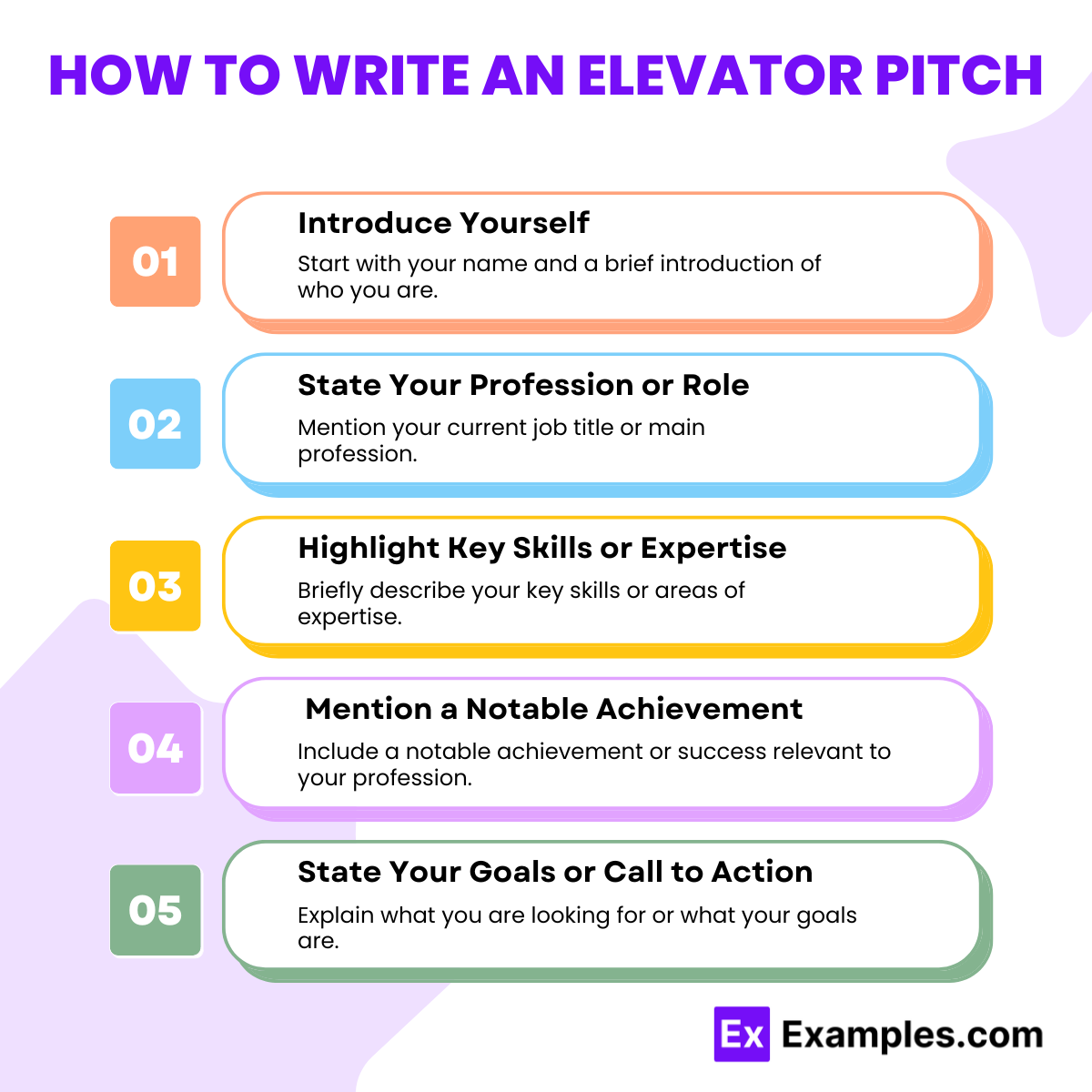
Writing Your Elevator Pitch
1. Identify Your Goal
Determine the purpose of your pitch. Are you introducing yourself, seeking a job, pitching a product, or looking for investment? Your goal will shape the content of your pitch.
2. Start with a Hook
Begin with a strong opening statement to capture attention. This could be an intriguing fact, a bold statement, or a compelling question.
3. Introduce Yourself
Briefly state your name, current role, and relevant background information. Keep it concise and relevant to your goal.
4. Explain What You Do
Summarize your key skills, experiences, or what your business/product does. Focus on what sets you apart and makes you unique.
5. Highlight Key Achievements
Mention specific accomplishments or experiences that demonstrate your value. Use quantifiable results when possible to add credibility.
6. Convey Your Value Proposition
Clearly articulate the benefits or value you bring to the table. This should address how you can solve a problem or meet a need for your audience.
7. Include a Call to Action
End with a clear call to action. This could be a request for a meeting, an invitation to discuss further, or an ask for contact information.
8. Keep It Concise
Aim for a pitch length of 30-60 seconds. Be brief and to the point, ensuring every word adds value.
Ways to Avoid Common Mistakes in your Elevator Pitch
Delivering Your Elevator Pitch
1. Practice Regularly
Rehearse your pitch multiple times until you can deliver it naturally and confidently. Practice in front of a mirror, with friends, or record yourself to refine your delivery.
2. Use Positive Body Language
Maintain eye contact, smile, and use appropriate gestures to engage your audience. Positive body language can enhance your message and make you appear more confident and approachable.
3. Speak Clearly and Confidently
Ensure your voice is clear and audible. Speak at a moderate pace, and avoid filler words such as “um” and “like.” Confidence in your delivery will make a strong impression.
4. Be Adaptable
Be ready to adjust your pitch based on the audience and context. Tailor your message to the specific interests and needs of the person you are speaking to.
5. Engage Your Audience
Pay attention to the listener’s reactions and be prepared to answer any questions or expand on certain points. Engaging with your audience shows you are interested in their perspective.
6. Follow Up
If appropriate, follow up with a thank you email or LinkedIn message, reiterating your interest and the main points of your pitch. This can help reinforce your message and keep the conversation going.
How to do an Elevator Pitch
Your elevator speech will serve a variety of functions, some more important than others. We can help you with whatever goal you have in mind. Here are some tips on how to write an elevator pitch.
Step 1: Introduction
Open your elevator speech with something captivating and relatable. For instance, identify a common industry pain point they’ll be familiar with to spark . From here you can start explaining what you do.
Step 2: Write a powerful Elevator Pitch
Start with your name. Write about what you do and how you do it. Explain your results and your uniqueness.
Sep 3: Make corrections
Modify what you’ve written. Cut out unnecessary words and muddled phrases. Get rid of the ones that mimic your speech pattern.
Step 4: Practice more often
Make a recording of your sales presentation. Verify that you haven’t used any unnecessary words and that your phrases don’t seem as forced as those on promotional flyers. Make sure you don’t speak too quickly and remain within the allotted 30 seconds.
What is an elevator pitch?
An elevator pitch is a brief, persuasive speech to spark interest in a product, idea, or person, typically lasting 30-60 seconds.
Why is an elevator pitch important?
It helps make a strong first impression, conveys key information quickly, and opens doors to further conversation or opportunities.
How long should an elevator pitch be?
Ideally, an elevator pitch should be between 30 to 60 seconds.
What should an elevator pitch include?
It should include an introduction, your objective, key achievements, value proposition, and a call to action.
How do I start an elevator pitch?
Begin with a strong hook or opening statement, followed by your name and a brief introduction.
What is the goal of an elevator pitch?
The goal is to capture interest, communicate your value, and prompt further engagement or action.
How can I make my elevator pitch memorable?
Use a compelling hook, be clear and concise, highlight unique achievements, and deliver it confidently.
When should I use an elevator pitch?
Use it at networking events, job interviews, career fairs, business meetings, and any opportunity where quick, impactful communication is needed.
How do I practice my elevator pitch?
Rehearse regularly, get feedback from friends or colleagues, and practice in front of a mirror or record yourself.
Can an elevator pitch be customized?
Yes, tailor your pitch to suit different audiences and contexts, emphasizing relevant skills and experiences.



